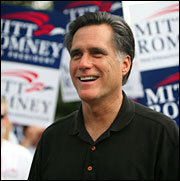Cross-posted from Climate Progress.
Republican presidential candidate Mitt Romney, like his fellow GOP contenders, supports unlimited coal and oil production and opposes cap-and-trade markets to limit greenhouse pollution. Romney calls cap-and-trade a “radical feel-good” policy that would have “devastating results for people across the planet.” Last month, he told Fox News that the nation needed to “start drilling for oil” and to “use our coal resources” because “you have to have oil and gas to power America’s economy.”
But according to his standards, Romney himself used to be a “radical” environmentalist who supported clean energy policy and opposed a pollution-backed economy. Back in 2005, Romney told the Boston Globe he was “convinced” that cap-and-trade was “good business.” It was his administration, in fact, that helped guide the development of the Regional Greenhouse Gas Initiative, a cap-and-trade system in the Northeastern U.S. that has raised $860 million for energy efficiency and renewable energy programs.
In 2003, Romney fought to protect public health by supporting environmental controls on a Massachusetts coal plant that was responsible for dozens of premature deaths and 14,400 asthma attacks each year, according the Harvard School of Public Health. Announcing new regulations on the coal pollution, Romney said that he would “not create jobs or hold jobs that kill people”:
I will not create jobs or hold jobs that kill people. And that plant kills people and PG&E has been given a notice to have it cleaned up by 2004 and they have thumbed their nose at the people of Massachusetts and Salem Harbor by not cleaning it up on time. So we’re saying, clean it up on time, do the job in the community, invest in cleaning technology.
Watch it (via a minidoc by Vision for Salem):
[vodpod id=Video.16251565&w=425&h=350&fv=%26rel%3D0%26border%3D0%26]
One has to wonder where the old Romney went. According to Seth Kaplan of the Boston-based Conservation Law Foundation, the old Romney disappeared while he was still governor of Massachusetts, posturing for the presidential election in 2007.
“You could see the flip starting to happen then — whether it was directly related to his running for president, you can’t say for sure. But they happened at the exact same time,” Kaplan tells ThinkProgress.




